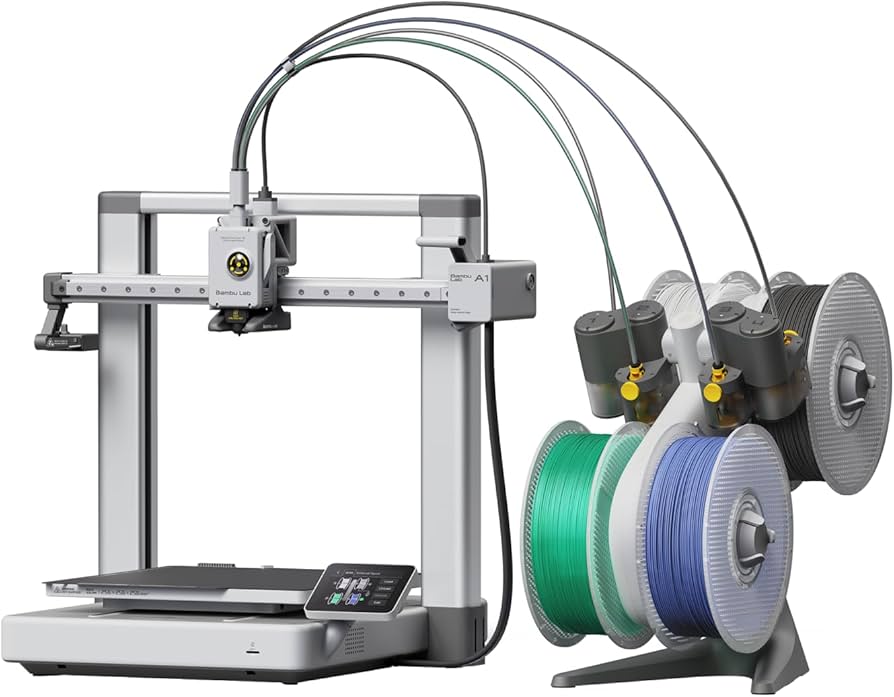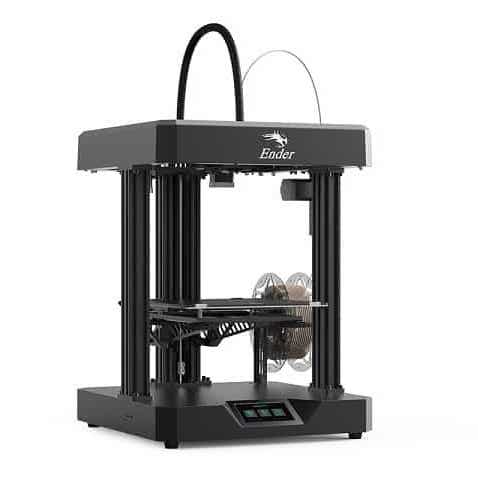Compare A1 vs Ender 7
Comparison between the best 3D printers
Choose the best 3D printer at the best price. The cheapest 3D printers are here.
Buy a 3D printer here with 3D Fila.
 |
 |
|
| Model | A1[BUY A1] |
Ender 7[BUY Ender 7] |
| Printing Material | Filament | Filament |
| Buy Filament for Bambu Lab A1 | Buy Filament forCreality 3D Ender 7 | |
| Estimated price | $700,00 | $429,00 |
| Manufacturer | Bambu Lab | Creality 3D |
| Release Year | 2023 | 2021 |
| Print Volume [mm] | 256x256x256 | 250x250x300 |
| Printer Size [mm] | 385x410x430 | 430x460x570 |
| Weight [kg] | 8,3 | 17,2 |
| Power Loss Recovery | YES | YES |
| Enclosed printer | NO | NO |
| Bed Leveling | Automatic | Manual |
| Filament End Sensor | YES | YES |
| Bed type | Heated | Heated |
| Power supply system | Direct Drive | Bowden |
| Standard nozzle | 0,4 | 0,4 |
| Maximum Nozzle Temperature [°C] | 300 | 260 |
| Maximum Bed Temperature [°C] | 100 | 100 |
| Maximum printing speed [mm/s] | 500 | 250 |
| Filament holder | YES | YES |
| Camera for supervision | YES | YES |
| Recommended filaments | PLA, PETG, TPU, PVA | PLA, PETG, Tritan, Flex, ABS |
| Recommended slicers | SuperSlicer, PrusaSlicer, Cura, OrcaSlicer | Cura, Simplify, Slic3r, IdeaMaker |
| Maximum Resolution [mm] | 0,1 | 0,1 |
| Processor | Creality CR-FDM V.2.4.S1_V101 32bits | |
| Display | Touchscreen 3,5 | Display touchscreen 4,3'' |
| Power Supply | 350 W | 110/220V / 350W |
| Connectivity | Wi-Fi, Bambu-Bus, Cartão Micro SD | SD / USB |
| Operating systems | Windows, Linux, Macbook | Windows, Mac, Linux |
| Date of registration in the system | 2024-07-17 | 2022-11-04 |
| Release date | 2023 | 2021 |
| Extra features | The BambuLab A1 printer features fully automatic calibration, multi-color printing with the AMS system, active flow rate compensation, quick nozzle change with a clip, active motor noise cancellation, a build volume of 256x256x256 mm³, a maximum extruder temperature of 300°C, and a heated bed of up to 100°C. In addition, it has high precision, a machine health management system and an intuitive 3.5-inch touchscreen interface. | Crealitys Ender 7 printer offers remarkable print speeds, utilizing CoreXY kinematics for precise and fast movement. With a 250x250x300mm build area, dual direct extruder, and custom hotend, the Ender 7 is capable of printing at high speeds, although quality may suffer on smaller prints. Assembly is relatively straightforward, but the machine is noisy and can get hot. Its true speed potential is most noticeable on larger prints, where it outperforms its competitors. |
| Support for multiple colors and materials (AMS and CFS) | YES | NO |
Notes * |
||
| Cost-benefit | 7 / 10 | 7 / 10 |
| Hardware | 4.8 / 10 | 2.4 / 10 |
| Tela | . | . |
| Print volume | 4 / 10 | 4 / 10 |
| Performance | 4 / 10 | 2 / 10 |
| [BUY A1] | [BUY Ender 7] |
Conclusion |
| In comparing the Bambu Lab A1 and the Creality 3D Ender 7, several key factors emerge that can help potential buyers make an informed decision. Starting with price, the Ender 7 is available at a significantly lower cost, making it a more budget-friendly option. However, the A1 offers advanced features and capabilities that justify its higher price point. Regarding performance, the A1 excels with faster maximum printing speeds and a greater range of recommended filaments, including support for multi-color printing. Its automatic bed leveling and advanced calibration systems contribute to user-friendliness and precision, making it particularly appealing for those looking to achieve high-quality results with minimal hassle. In contrast, the Ender 7, while providing commendable speed, can be noisier and may have challenges with print quality on smaller items. From a build volume perspective, both printers offer similar dimensions, although the A1 has a slightly more compact structure while still managing a robust build area. The automatic features of the A1, such as filament sensors and power loss recovery, enhance its reliability for continuous prints. In summary, for users who prioritize speed, advanced features, and higher-quality prints, the Bambu Lab A1 presents a compelling option, albeit at a higher price. On the other hand, the Creality 3D Ender 7 is better suited for those on a budget who still want decent performance, especially for larger prints, but may be willing to deal with some minor limitations in features and noise. Ultimately, the choice between these two printers will depend on individual needs, budget considerations, and the desired level of print quality. |

